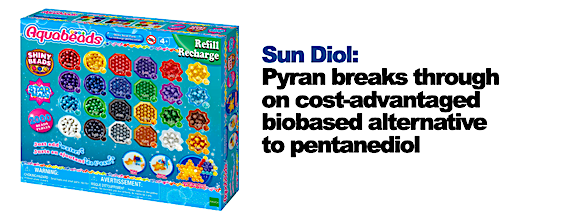Sun Diol: Pyran breaks through on cost-advantaged biobased alternative to pentanediol

You may recall, about the time the Digest was founded back in 2007, a multi-national product scandal that erupted when it turned out that a shipment of colorful set of children’s’ design beads, called Bindeez, was improperly made from 1,4 butanediol instead of the non-toxic plasticizer known as 1,5 pentanediol. Sounds like a harmless swap? Well, ingesting large quantities of plastic beads, as children are known to do, resulted in the chemical being metabolized into GHB, which is used as an anesthetic and a date-rape drug, known as liquid ecstasy.
While it was never conclusively established, so far as I know, why 1,4 butanediol was used instead of pentanediol, but we might simply note that 1,5 pentanediol, made in the traditional manner from glucaric acid, costs between two and seven times as much as 1,4 butanediol.
It’s a reminder that there are drivers for the bioeconomy that are unrelated to climate change.
This story is different: what if renewable 5-carbon products could replace expensive, petroleum-based chemicals, which are limited in supply, at a cost of more than 40% below today’s market price? Fan-darn-tastic.
Accordingly, we have the very good news to share that Pyran is expanding sales of 1,5-pentanediol (PDO) to select, pre-approved customers as it has achieved critical milestones necessary to begin operating its world-scale commercial plant for the product in 2026.
Even better news, Pyran has scaled its technology, recently producing ton quantities of 1,5 PDO and validated the technology at commercial scale in a toll manufacturing facility. The toll manufacturing production run also enabled the company to gather information required for the engineering necessary for the company’s world-scale commercial plant. Our understanding is that the tolling partner is RPD Technologies in Crosby, Texas.
The broader bio-PDO rationale
Pyran uses renewable feedstocks from crop resources, such as corn cobs, to make 1,5-pentanediol (PDO) – a key ingredient that enhances the performance of everyday materials, such as paints, coatings, adhesives and more.
Customers of PDO have been restricted from using the performance-enhancing product because petroleum-based capacity is constrained by co-product limitations. Pyran’s renewable-based, on-purpose production will enable customers to expand their businesses with better performing and more sustainable products.
Why have the diols been so successful?
Think DuPont’s propanediol, Genomatica’s butanediol, now Pyran — why so much success in this niche in the renewable chemicals galaxy. One reason, we think, is that diols are oxygenated molecules, that oxygen in biomass has somewhere to go, a use, that makes biobased feedstocks much easier to use. In this case, 1,5 PDO is roughly 30 percent oxygen, radically different to oxygen-free polyethylene.
Funding update
Pyran closed on the second half of its Series A equity funding round earlier this year, raising $1.5 million. Coupled with its initial Series A equity funding, Pyran has raised nearly $4 million between the two tranches and approximately $7.5 million in grants, loans and equity capital since its founding in 2018. Investment comes from lead investor, Arosa Capital, with support from the venture arm of the Wisconsin Alumni Research Foundation and other investors.
In 2021, industry veteran Mel Luetkens joined as CEO. Luetkens previously was technology director for INEOS and most recently served as COO, CTO and CEO of multiple bio-material companies where he has helped lead company growth, new facility construction and more than $300 million in equity financing.
The Pyran backstory
Back in 2021 we ran this Q&A item:
Q: What was the reason for founding your organization – what was the open niche you saw that could be addressed with a new product or service? What was the problem, or gap, or opportunity?
To commercialize a technology to produce 1,5 pentanediol. Polymer producers want new green low-cost monomers and monomers that give their polymers a performance advantage. 1,5 pentanediol is used in several high-performance polymer applications.
Q: Tell us about your organization. What do you do?
We are in the process of commercializing the technology to produce 1,5 pentanediol. We have global exclusive rights to the technology that was originally developed at the University of Wisconsin in the research groups of Professors George Huber, Jim Dumesic and Christos Maravelias as part of a DOE BETO program.
Q: What do your technologies, products or services do and accomplish – how does it (they) work, who is it (they) aimed for?
1,5 pentanediol is used as a monomer to produce a wide variety of polymers including polycarbonate diols and polyester polyols. These polymers are used in paints, coating, polyurethane and even for synthetic leather. 1,5 pentanediol can also be used to create new types of biodegradable polymers. Pyran produces 1,5 pentanediol from furfural. Furfural is the largest by volume biochemical that is produced from corn cobs. 1,5 pentanediol cannot be produced on purpose from petroleum and is only produced as a minor byproduct during caprolactam production.
Q: Competitively, what gives your technology, product or service set an edge in cost or performance, sustainability, or any other aspect, that makes it stand out from the crowd, In short, what makes it transformative?
The key advantage is that we are producing a 5-carbon molecule from biomass that is very expensive to produce from petroleum. We can produce 1,5 pentanediol at lower cost than petroleum. Pyran’s pentanediol is high performing, sustainable, allows downstream customers to not be dependent on oil and fits into the existing polymer market.
Reaction from the stakeholders
“Our successful manufacturing campaign with renewable feedstocks now enables customers to further expand their businesses with a better performing and more sustainable product,” said Kevin Barnett, Pyran co-founder and chief technology officer. “We have ramped up our capabilities so that our customers can do the same.”
More on the story
Customers interested in more information about 1,5 PDO should complete the contact form right here.
Category: Top Stories














